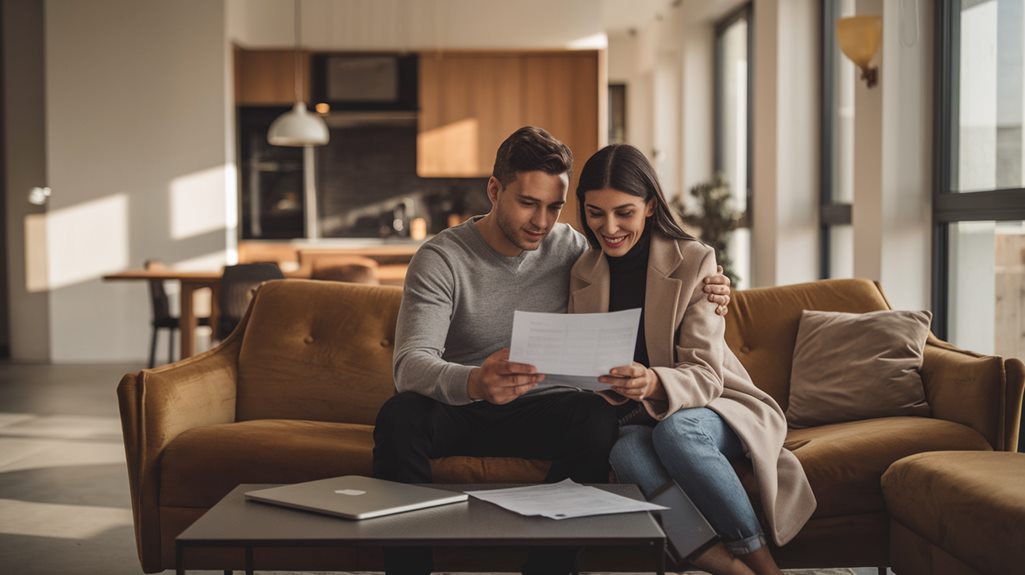Buying your first home can feel big and exciting! Start by looking at your money. Check how much you earn and spend to set a budget.
Think about how much you want to save for a down payment—try to save 20% if you can. It helps to get pre-approved for a mortgage. This shows sellers you are serious.
Finding a good real estate agent can make things easier. They know the market and can help you find homes. Go to open houses to see what you like.
When you find a place you want, make a smart offer. Before you close the deal, learn about any extra costs, like fees.
Each step is important, so plan carefully. There's a lot to know, but with these tips, you can find a great home just for you!
Ready to start building equity in your own Michigan home? Get your personalized home loan quote today.
Key Takeaways
- Check your money situation by making a budget. Write down what you spend to find ways to save.
- Save up for a down payment. Try to save about 20% of how much the house costs.
- Look at different mortgage choices. Find one with good terms and interest rates that work for you.
- Pick a good place to live. Look for good schools, fun things to do, and safe neighborhoods.
- Get help from a real estate agent. They know a lot about the market and can help you make good deals.
Michigan residents, unlock the door to your new home. Request your home loan quote from Treeside Financial today.
Assess Your Financial Health

Before you start looking for a home, it's really important to check your money situation. This will help you know if you're ready for such a big purchase.
First, look at how you use your credit and how you manage your debts. These things show if you're financially ready.
Next, make a budget. This will help you plan your money better. It's also smart to save some money for emergencies. This way, you won't be caught off guard by surprise costs. Having a steady job helps you feel secure, too.
Keep track of what you spend each month. This will help you learn about your money and find ways to save more.
It's good to build up your savings and learn about investing so you can grow your money over time.
Determine Your Budget
Making a budget is very important when you want to buy a home. It helps you know how much you can spend.
First, look at how much money you make and how much you spend each month. This will help you find a price range that works for you. It's smart to choose neighborhoods that aren't too expensive. These places are often friendly and welcoming to new people.
When you look at homes, think about ones that might need a little work. If a house needs small updates, you can make it your own without spending too much money.
Having a clear budget helps you make good choices that match what you can afford and what you dream of in a home. A good budget makes your journey to buy a house easier and more fun!
Explore Mortgage Options

Finding the right mortgage for your new home can feel a bit tricky, but it's a very important step. First, you should look at fixed-rate and adjustable-rate mortgages. These can change how much you pay over time.
Next, think about the loan terms and interest rates that work for your budget and future plans. Sometimes, you need mortgage insurance, which can add to your monthly costs.
Also, don't forget to check for lender fees. These can change a lot and affect how much you pay overall. Make sure you know when you'll close on the house to make moving in easier.
Look into government loans for lower interest rates, or check out conventional loans for more choices. You might even think about refinancing later for some extra financial help.
Save for a Down Payment
To save for a down payment, first, decide how much money you need.
Think about the kind of home you want and how much it costs.
Look for help programs that can make saving easier, especially for first-time buyers.
These programs can help you reach your money goal faster.
Establish Savings Goal
Saving money for your first home is super important! First, think about what you need and want. Look at how much homes cost where you want to live.
It's smart to save money in a special account just for your down payment. You can make it easier by putting a little money in each month, like a piggy bank.
Usually, people save about 20% of the home price for a down payment, but this can change depending on the type of loan you get.
To save more, try to spend less on things you don't really need. Stay focused on your dream of owning a home.
If you stick to your savings plan, you'll join many happy homeowners who reached this big goal!
Explore Assistance Programs
If you're buying your first home, there are many programs that can help you save money for your down payment. It's really important to look into options like state help, local grants, and federal programs. These can make it easier for you to afford your new home.
Many of these programs are made just for first-time buyers, so they can meet your special needs.
To find out if you can get help, check the income limits for each program. You can also talk to housing counselors who know a lot about these options. They can help you understand everything better.
Homebuyer education programs are great too! They teach you about the resources available and give you the knowledge you need to feel ready.
Don't forget to reach out to community resources in your area. They can provide support and information that can help you a lot.
Get Pre-Approved

To buy a home, the first step is to get pre-approved for a loan.
This means you need to learn about the types of loans you can get. Start by gathering your money papers and work on making your credit score better.
When you do this, you'll know how much money you can spend and have a better chance of getting a good mortgage rate.
Understand Loan Options
Buying a home can be exciting, but it can also feel a bit confusing. One important part is understanding your loan choices. These choices can change how much money you pay and how you manage your budget in the future.
There are different types of loans. Some loans have fixed rates, which means your payment stays the same every month. Other loans have adjustable rates, which can change over time. If you want to save money, credit unions might offer good deals. There are also government programs that can help with things like insurance and down payments.
It's important to check what lenders need from you. Make sure you meet their rules so you can find a loan that works for you.
When you learn about these options, you can make smart choices. Think about how different loans might change your payments and total costs.
Gather Financial Documents
To get ready for a loan, the first step is to gather your important papers. This will help you get pre-approved. Start by collecting documents that show how much money you make. You can use pay stubs or letters from your job to do this.
It's also good to have papers that show your spending and your tax returns. These help show that you're good with money.
Don't forget about your credit history! Lenders want to know if they can trust you. So, include your bank statements and any savings accounts to show that you can make a down payment.
Lastly, write down what debts you have. This gives lenders a complete picture of your money situation. By organizing your documents well, you can make the pre-approval process easier and less stressful.
Improve Credit Score
Improving your credit score is an important step when buying a home. It can help you get better loan terms and lower interest rates.
To boost your score, make sure to pay your bills on time. This shows you're responsible with money. Try to keep your credit use below 30% of what you have available. This also helps your score.
Check your credit regularly. There are tools that can help you see your score and fix any mistakes. Be careful not to apply for too much credit at once. Each time you do, it can hurt your score a little bit.
Knowing your debt-to-income ratio is important, too. It helps you manage your payments and makes it easier to get loans.
Having different types of credit, like a credit card and a loan, can also help your score.
Learn about money and make good choices. This will get you ready for homeownership. A good credit score helps you feel like part of the community of happy homeowners.
Choose the Right Location
Choosing the right place to live is very important when buying a home. It can affect how much your home is worth in the future and how you feel every day.
First, think about schools. Good schools can make homes more valuable, even if you don't have kids.
Next, look into any new buildings or parks that might be coming soon. These can make the area better and help your home's value grow.
Check out community places like parks and playgrounds. They make life more fun!
Also, living near buses or trains can help you get to work easier and make your home more appealing to others.
Safety is key too. Look up crime rates and talk to people in the neighborhood to see if it feels safe and friendly.
Lastly, think about fun places around, like museums or theaters. These can make your life more exciting and help you feel like you belong.
Make sure the place you choose feels just right for you!
Work With a Real Estate Agent

Buying a home can feel really big and scary. But having a smart real estate agent by your side can make it much easier! They know a lot about the market and can help you with negotiations, so you feel more confident. A good agent always plays fair, making sure everything is open and honest. They keep you updated, so you feel like you belong during the whole buying journey.
Here's a simple way to see how having an agent helps:
| What You Get | With an Agent | Without an Agent |
|---|---|---|
| Market Knowledge | Expert help | Limited info |
| Negotiation Help | Strong support | Harder to handle |
| Fair Play | Always honest | Up to you |
| Communication | Regular updates | Rarely hear back |
| Time Saving | Faster process | Slower process |
Finding the right agent can help you find your perfect home!
Attend Open Houses
Going to open houses is a fun way to find your new home! While a friendly real estate agent can help you, seeing the houses in person is even better. You can learn a lot about the neighborhood, like if there are parks or schools nearby.
When you visit an open house, take your time to look around. Talk to the agent there and ask any questions you have. Look closely at the details of the home too. This is your chance to see if the house feels right for you and your family.
Make an Offer

When you find a house you really like, it's time to make an offer. First, look at how other houses are priced so you can make a good offer. Work with your real estate agent to come up with ways to negotiate. Think about what other homes like it sold for and how the house you want looks.
It also helps to know why the seller is selling. Do they need to sell fast? Or are they waiting for the best price?
Next, set a timeline for your offer. This shows that you're serious about buying the house. Be ready to make your offer quickly, but also be open to any counteroffers.
This not only helps you in the deal but also makes you feel part of the process. With these tips, you have a better chance to get the home of your dreams!
Prepare for Closing
As you get ready to close on your new home, it's important to know about the closing costs.
These are extra fees you'll need to pay. Make sure to read all the papers very carefully so there are no surprises.
Work closely with your lender to help make everything go smoothly.
Soon, you'll be a homeowner!
Understand Closing Costs
Buying a home can be a little tricky, especially when it comes to closing costs. These are the extra fees you pay to make the house truly yours.
First, it's important to know about things like title insurance and property taxes. These costs can add up quickly!
You can try to talk with people about the prices of inspections or appraisals to see if you can pay less. An escrow account is like a special bank that holds your money for things like home warranties and taxes.
Keep an eye on the closing timeline so everything goes smoothly. A title search is important too. It helps you avoid problems later on.
Sometimes, you can ask the seller to help pay for some of these costs.
Review Final Documents
Checking your final documents before closing on your home is very important. It helps protect your money and makes sure everything is correct.
As you look through your papers, pay close attention to each page. Make sure names, property details, and money amounts are all right. If you find any mistakes or things that don't match, it's a good idea to fix them now. This will help you avoid problems later and make you feel good about your big decision.
Think about getting help from a real estate lawyer or a trusted friend. They can make you feel more confident.
This is your chance to ask questions and make sure everything is just as you want it. Remember, you're not just buying a house—you're finding a place to call home!
Coordinate With Lender
Getting your mortgage is an important part of buying your new home. Having a good relationship with your lender helps make everything go smoothly. It's good to stay in touch and make sure you know your closing date and what papers you need. Here's a simple list to help you stay on track:
| Task | Action |
|---|---|
| Confirm Closing Date | Call your lender to check the date |
| Review Loan Terms | Make sure the terms match what you agreed |
| Gather Documents | Collect your pay stubs, tax papers, etc. |
| Finalize Payment | Check your down payment and closing costs |
Your lender is there to help you. Keep talking to them so you can fix any last-minute changes. By following these steps, you'll feel more confident and excited about your new home!







